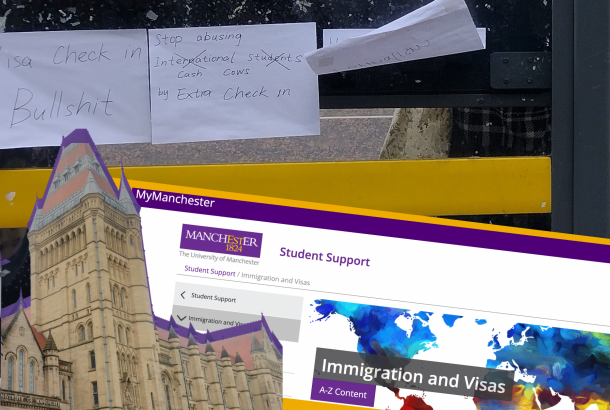“They decided they didn’t want a Nightline any longer”: Why did Manchester SU close Nightline?

Words by Rachel Pennington
On September 23, the Greater Manchester Nightline announced its closure through an announcement on Instagram. Greater Manchester Nightline was an anonymous listening service staffed by student volunteers. Nightlines, which run from 8pm – 8am, 7 days a week, dedicate their services to “ensuring out of hours emotional support is available for all students.” The scheme was well advertised around campus through stickers, pamphlets, and posters.
The announcement stated that the closure was the “decision of the University of Manchester Students’ Union.”
At the time of closure, a Students’ Union spokesperson stated:
“After a long period of careful evaluation, we have come to the difficult but necessary conclusion to close Nightline. As we close, we recognise the dedication that volunteers past and present have contributed, something they should take great pride in, and have offered them support through UMSU’s Advice and UoM Counselling services as well as providing alternative volunteering opportunities so they can continue to channel their passions for helping students here in Manchester.”
The Process of Closure
When speaking to the CEO of Nightline Katie Endacott, The Mancunion was informed that the Manchester Nightline was “closed for a variety of reasons, and they were managed by the University of Manchester SU, who decided they didn’t want a Nightline any longer.”
When asked to elaborate on these reasons, Katie told us she “[couldn’t] share any more than what Manchester SU shared in their statement, and what [she] had already said – simply because there [wasn’t] anything more underneath it all.”
However, the reasons and process for closure appear to be less straightforward. In an interview with the Students’ Union Wellbeing and Liberation Officer, Aisha Akram, Aisha stated that a “careful review into Nightline was conducted after a few complaints from students about the services.”
The review involved different members of staff from across the University. Volunteers were spoken to as part of this review, including those from the Nightline committee.
“The main reason for closure was that the running of Nightline was not in line with SU protocol – volunteers had difficulty with their own wellbeing, which was not being focused on, and were not fully equipped to deal with more serious cases… Nightline did not manage these volunteers very well, who would receive harassment calls to the service.” She revealed that the service was “preventing students from accessing more professional support beyond the Student’s Union.”
Aisha also addresses that the SU did everything in their power to phase out Nightline so that vulnerable students would not be affected by a sudden halt: “The service continued throughout the review so there was no abrupt end. There was a lot of communication between the SU and Nightline and the running of the service in Greater Manchester was not aligned with what the service should have been… It was not an easy decision to make.”
In one final goodbye to the Manchester service, Nightline is holding a ball in Manchester City Centre on December 13, in order to help everyone “connect” after the closure of the service and to celebrate all of Manchester Nightline’s “memories, friendships, and achievements.
Nationwide Issues
The reasons for Manchester Nightline’s closure appear to be symptomatic across the country. The Mancunion contacted over twenty branches of Nightline to aid this investigation.
One branch detailed the shift in their University’s working relationship with them: “Our University has moved us into a space which is not adequate for our needs. The building is due to be demolished, and it isn’t a residential building meaning technically we haven’t been allowed to sleep on our 13-hour shifts.”
“We often have to deal with staff who don’t understand Nightline’s impact and treat our volunteers with disrespect […] We are a small team with a big workload, and not delivering what we wish to has a big impact on our own mental health.”
The Exeter branch of Nightline further acknowledged the pressures on volunteers from staff and callers: “The support a Nightline offers to students is often invisible – our calls are anonymous and confidential – and can be underappreciated unless staff members are aware of how a Nightline fits into the mix of support provisions available at a university”.
They also, however, acknowledged Nightline as being invaluable to all student communities: “There is no direct substitute for the dedicated out-of-hours peer support that a university Nightline offers, and we hope that Manchester’s Student Union reconsiders its decision.”
Volunteering for Nightline is a stressful, yet mostly rewarding commitment. A volunteer who worked for Manchester’s Nightline during 2022 described their experience to The Mancunion as “draining” but “rewarding”, worrying some vulnerable students would be “without somewhere to turn” otherwise. They recalled their own experiences using another university’s Nightline and were “grateful and appreciative for the listening support provided.”
Students expressed their dismay at Nightline’s closure on Instagram, with one ex-student calling the SU’s decision “ludicrous” at a time when students need mental health support “more than ever.”
Another commenter proclaimed that Manchester’s Nightline will have made an “immeasurable difference” to the student community, commending Nightline’s efforts as a “real asset” to the SU. They called for a reconsideration of this decision and to “harness the power of peer support” rather than shy away from it.
The Rise of Texting Culture
As technology both forms and adapts to the social lives of our generation, it calls into question whether passive listening-services such as Nightline are as useful in treating those who suffer with mental illness in comparison to text-based services and the in-person support that the University provides.
An anonymous volunteer from another Nightline branch suggested Nightline’s invisibility may be to its detriment, detailing that “hardly anyone knows what Nightline is.”
“I give talks at the beginning of lectures and ask who knows us and what we do and it’s usually only 5/60 people. Another problem that Nightline as an organisation face is the shift in culture of students where nobody calls anymore.”
The growth of a ‘texting culture’ within the current student generation limits the scope of a listening service to those who want to pick up the phone. The remnants of social isolation from 2020 continue to impact a demographic who find calling rather daunting.
The Mancunion spoke to several students on the rise of online-focused communication.
Isabel, a second year English Literature student, worries about the rise of this culture: “I think that it’s creating a generation that’s not very present in their surroundings.”
However, noting the increase in social anxiety and voiceless communication, she also acknowledged that the rise in a texting culture might have caused more harm than good. Isabel told The Mancunion for those who might be introverted or suffer from social anxiety, “texting has probably inhibited their desire to answer the phone because there’s a way to communicate without need for human interaction.”
Flo, another second-year English Literature student, suggested there was an overlap between which form of communication she preferred:
“In terms of emotional or colloquial conversations I’ll always prefer phone calls, but in terms of professional settings, or booking appointments, I prefer emailing or texting as the formality is significantly more stressful.”
Other interviewees, including English Literature and History student Grace, argued that “people in our generation don’t often want to pick up the phone as certain social etiquette has changed, especially since our generation is so much more online.”
Nonetheless, text-based mental health therapies have been proposed to be as effective as standard care, according to a 2023 study by The University of York. Findings suggested that internet-delivered text-based therapies had a shorter waiting time and treatment time than traditional services and could reduce the financial burden on the NHS, potentially saving around £600 million.
Post Nightline
Despite Nightline’s closure, plans to move forward from Nightline and implement a tailored programme of mental health support in the Manchester SU are well on their way. Speaking to Aisha, she describes the plan as having three aspects. “The first is the Student Hub Project, wherein I have been on a recruitment panel for new wellbeing ambassadors. There will be four ambassadors in each School hub for peer-to-peer support, which will signpost students to other support mechanisms. Listening to the feedback from Nightline, people wanted that peer-to-peer support but did not want it anonymously.”
The second aspect is a preventative measure for students in crisis: “This aspect will be rolled out next year, and it is more of a preventative measure than a crisis measure. Ambassadors will have a list of students that may have been referred or at risk of poor mental health, and will provide regular mental health check ins. They will be provided with adequate training to signpost these students to other parts of the University, and if anyone is in more of a critical situation, concerns can be flagged directly.’
The last aspect is a continued endorsement of the independent external provider, Health Assured: “This is accessible 24 hours a day through their helpline and their app, and can provide support to students outside of the Counselling and Mental Health Service’s opening hours.”
In response to this article, Professor Michael Sanders, the Chair of Trustees of the Nightline Association, said:
A Manchester Students’ Union spokesperson said:
“We understand there may be differing perspectives on the Students’ Union’s decision to close Nightline. We encourage an ongoing dialogue to address concerns and share insights that contribute to the betterment of support services for our members.”
The University offers a range of support services.
- Advice & Response Team
- School Support Office
- ResLife
- Multifaith Chaplaincy
- Peer Support programmes
You can access the University’s subscription to Health Assured by downloading the iOS or Android app and entering the code: MHA147866
Other Local Services:
- SHOUT UK, a free text-based hotline available 24/7, Text ‘SHOUT’ to 85258
- Manchester Crisis Line, a free 24/7 mental health crisis hotline available 24/7, 0800 953 0285
If you or someone else is in immediate danger, call 999. You should attend your local NHS Accident & Emergency if you need urgent physical health care or require an urgent mental health assessment.
If it is not an emergency but you require health advice, visit NHS 111 online or call 111.







